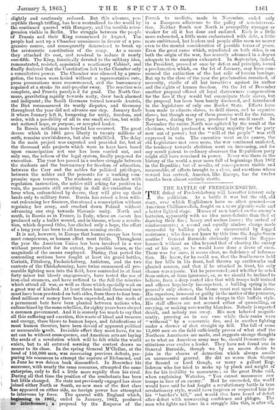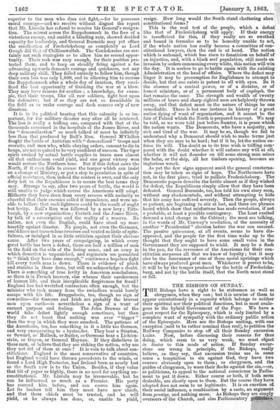THE BATTLE OF FREDERICKSBURG.
TIIE defeat of Fredericksburg will hereafter interest only the politician. As a battle it was but the old, old story, ovce which Englishmen have so often groaned—an. American Chillianwallah, fought on a more gigantic scale and a better lighted stage. Masses of men hurled on the enemy's batteries, apparently with no idea more definite than that of drawing their fire ; heavy and useless losses ; the arrival of reinforcements ; a second and equally aimless charge made successful by bulldog pluck, or unsuccessful by dogged resistance ; who does not know by this time the Anglo-Saxon routine ? General Burnside obviously crossed the Rappa- hannock without an idea beyond that of clearing the enemy out of his way, as he would have done a drove of oxen. There was for once, it seems clear, no deficiency of informa- tion. He knew, for he could see, that the Southerners held the low hills in his front, had thrown up earthworks and planted cannon, and that if he attacked in front, his only chance was a panic. Yet he persevered ; and whether he acted from orders, or from ignorance, or, as we should be inclined to believe, from a deep rooted idea that with troops half trained and officers hopelessly incompetent, a bulldog spring is the general's only chance, the blame must rest upon him alone. His superiors, innocent or guilty in the matter of the pontoons, Certainly never ordered him to charge in this buffalo style. His staff officers are not accused either of quarrelling, or envying, or making noteworthy blunders. Nobody is reported drunk, and nobody ran away. His men behaved magnifi- cently, pressing on in one case while their ranks were " withered " by a concentric fire, and in another fighting under a shower of shot straight up hill. The fall of some 15,000 men on the field sufficiently proves of what stuff the Northern Americans are made, and suggests strange thoughts as to what an American army may be, should Democratic in- stitutions ever evolve a leader. They have not found one in General Burnside, though we by no means desire to join in the chorus of detraction which always assails an unsuccessful general. He did no worse than George the Second or Lord Gough, or many a gallant Eng- lishman who has tried to make up by pluck and weight of fire for his inability to manceuvre ; as the great Duke said, when explaining Waterloo, "You cannot manoeuvre raw troops in face of an enemy." Had lie succeeded, the world would have said he had fought a revolutionary battle in true revolutionary style, would have forgiven or respected him for his "butcher's bill," and would then have heard of defeat after defeat with unwavering confidence and phlegm. The man who fights and loses in a struggle like this, is after all, superior to the man who does not fight,—for he possesses moral courage—and we receive without disgust the report that Mr. Lincoln has refused to receive his General's resigna- tion. The retreat across the Rappahannock in the face of a victorious enemy, and amidst a blinding rain, showed decided capacity for leadership, and General Burnside may yet efface the recollection of Fredericksburg as completely as Lord Gough did that of Chillianwallah. The Confederates are cer- tainly not such strategists as to allow him no second oppor- tunity. Their task was easy enough, for their position pro- tected them, and to keep on steadily firing against a foe advancing upwards demands courage and quickness, not any deep military skill. They failed entirely to follow him, though their own loss was only 1,800, and in allowing him to recross the Rappahannock after a whole day of inaction, they sacri- ficed the best opportunity of finishing the war at a blow. They may have reasons for caution ; a knowledge, for exam- ple, that their troops, like all raw soldiers, fight best upon the defensive; but if so they are not so formidable in the field as to make courage and dash sources only of new disasters.
It is in its political bearing that this calamity is so im- portant, for the military disaster may after all be retrieved. The loss is really a trifling one, compared with that of the thousands consumed in the hospitals of the James River, and the "demoralization" so much talked of must be infinitely less than that produced by Bull's Run. General M'Clellan fought the battle of Antietam with" demoralized" troops and recruits, and men who, while obeying orders, consent to die in heaps, are not required to be very confident of success. The tiger spirit evoked by actual battle supplies in brave men almost all that enthusiasm could yield, and one great victory won would restore the Northern tone. But if this defeat cows the North, if it even fails to arouse the temper which can insist on a change of Ministry, or put a stop to peculation in spite of official resistance, then indeed the contest is over, and the only duty left to the Republicans is to secure the best terms they may. Strange to say, after two years of battle, the world is still unable to judge which course the Americans will adopt. Hitherto they have risen from every reverse with audacity so cheerful that their enemies called it impudence, and were un- able to believe that such lightness could be the result of aught but levity. Bull's Run was followed by a new levy ; Pitts- burgh, by a new organization; Corinth and the James River, by talk of a conscription and the reality of a reserve. No nation, not even the English, could have stood up more heartily against disaster. No people, not even the Germans, could have met tremendous reverses and vented so little of spite- fulness, or indulged in so little criticism against their obvious cause. After two years of campaigning, in which every great battle has been a defeat, there are half a million of men in the field on the side of the losing cause, and an army in which desertion is unpunished, and regiments are permitted to "think they have done enough," continues a hopeless fight till every tenth man is down. There is evidence of pluck and stamina in those facts, but still we acknowledge a doubt. There is something of true levity in American nonchalance, as there is in French bravery, else whence their carelessness of human life, and their inexplicable forgiveness for fraud? England has had wretched contractors often enough, but the minister who took money from the swindlers would barely escape with his life. Braggadocio, too, though no sign of cowardice—for Gaseous and Irish are probably the bravest men upon earth—is nevertheless a sign of a want of earnest purpose and feeling. The John Browns of the world take defeat lightly enough sometimes, but then they do not boast that nothing was ever " bigger " than the way in which they were smashed. The patience of the Americans, too, has something in it a little too German, and very exasperating to a bystander. They bear a Stanton, or Seward, or Halleck, or Butler, as Germans bear a Lichten- stein, or Guyon, or General Haynau. If they disbelieve in these men, or believe that they are risking the nation, why are they not rid of them at once ? It is vain to talk about con- stitutions. England is the most conservative of countries, but England would have thrown precedents to the winds, or found a Lord High Protector, had Ireland been as nearly lost as the South now is to the Union. Besides, if they value that bit of paper so highly, there is no need for anything un- constitutional. Mr. Lincoln may be irremovable, but he can be influenced as much as a Premier. His party has coerced him before, and can coerce him again. Let its leaders tell him they must have new chiefs, and that those chiefs must be trusted, and he will yield, as he always has done, or, unable to yield, resign. How long would the South stand chattering abou constitutional forms ?
This is the real test of the people, which a defeat like that of Fredericksburg will apply. If their energy is insufficient for this, if they really are so swathed and bound in formulas as to be honestly unable to act, if the whole nation has really become a committee of con- stitutional lawyers, then the end is at hand. The nation which is unbound, which has risen to fanaticism on behalf of an injustice, and, with a black serf population, still meets an invasion by orders summoning every white, this nation will win the day. It is useless to go to battle again with the existing Administration at the head of affairs. Where the defect may linger it may be presumption for Englishmen to attempt to decide, but that one exists is patent to all with eyes. Be it the absence of a central power, or of a dictator, or of honest ministers, or of a permanent body of employe's, the fact remains the same. The strength and wealth of twenty millions of brave and sharp .sighted men are helplessly thrown away, and that defect must in the nature of things be one remediable. There is but one instance in history of a great nation dying of want of organization, and it cannot be the fate of Poland which the North is prepared to accept. We may be told, as we were told just before Sumter, it is peace which the nation wants. The Democrats, who have a majority, are sick and tired of the war. It may be so, though we fail to understand why a Democrat should wish to make terms just when they are sure to be hard; but if it be, let the nation en- force its will. The doubt as to its true wish is trifling com- pared with the doubt whether it will enforce any will at all, whether it will not flounder on till some strono.° man seizes the helm, or the ship, all her timbers opening, becomes an inglorious wreck.
As yet the few signs apparent amid the general consterna- tion may be taken as signs of hope. The Northerners have not, in the first place, tried to palliate Fredericksburg. The Democratic papers describe the battle almost as if they wished for defeat, the Republicans simply allow that they have been defeated. General Burnside, too, has told his own story soon, without any rhodomontade, and without attempting to hide that his army has suffered severely. Then the people, always so patient, are beginning to stir at last, and there are phrases heard which show that misfortune has made revolution, if not a probable, at least a possible contingency. The least excited demand a total change in the Cabinet; the most are talking, in the words of Mr. Conway's resolution, of the necessity of another "Presidential" election before the war can succeed. The passive quiescence, at all events, seems to have dis- appeared, and the people for the first time wake up to the thought that they ought to have some small voice in the Government they are supposed to wield. It may be a flash in the pan, for the reverence of the Americans for their con- stitution surpasses all that we know of loyalty; but it may also be the forerunner of one of those moral uprisings which have always produced great men. Whichever it proves to be, it will be by the temper produced by the battle of Fredericks- burg, and not by the battle itself, that the North must stand or fall.





























































 Previous page
Previous page